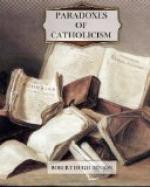I live, then, the perfect Catholic may say, as none other can say, when I have ceased to be myself. And yet not I, since I have lost my Individualism. No longer do I claim any activity at all on my own behalf; no longer do I demand to form my opinions, to follow my own conscience apart from that informing of it that comes from God, or to live my own life. Yet in losing my Individualism I have won my Individuality, for I have found my true place at last. I have lost the whole world? Yes, so far as that world is separate from or antagonistic to God’s will; but I have gained my own soul and attained immortality. For it is not I that live, but Christ that liveth in me.
IX
MEEKNESS AND VIOLENCE
Blessed are the meek.—MATT. V. 4.
The Kingdom of Heaven suffereth violence, and the violent bear it away.—MATT. XI. 12.
We have already considered the Church’s relations towards such things as wealth and human influence and power, how she will sometimes use and sometimes disdain them. Let us now penetrate a little deeper and understand the spirit that underlies and explains this varying attitude of hers.
I. (i) It has been charged against Christianity in general, and therefore implicitly and supremely against the Church that was for so long its sole embodiment and is still, alone, its adequate representative, that it has fostered virtues which retard progress. Progress, in the view of the German philosopher who explicitly made this charge, is merely natural both in its action and its end; and Nature, as we are well aware, knows nothing of forgiveness or compassion or tenderness: on the contrary she moves from lower to higher forms by forces that are their precise opposite. The wounded stag is not protected by his fellows, but gored to death; the old wolf is torn to pieces, the sick lion wanders away to die of starvation, and all these instincts, we are informed, have for their object the gradual improvement of the breed by the elimination of the weak and ineffective. So should it be, he tells us, with man, and the extreme Eugenists echo his teaching. Christianity, on the other hand, deliberately protects the weak and teaches that the sacrifice of the strong is supreme heroism. Christianity has raised hospitals and refuges for the infirm, seeking to preserve those very types which Nature, if she had her way, would eliminate. Christianity, then, is the enemy of the human race and not its friend, since Christianity has retarded, as no other religion has ever succeeded in retarding, the appearance of that superman whom Nature seeks to evolve.... It is scarcely to be wondered at that the teacher of such a doctrine himself died insane.




